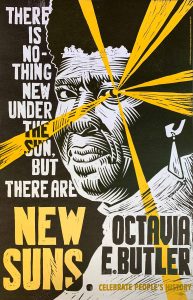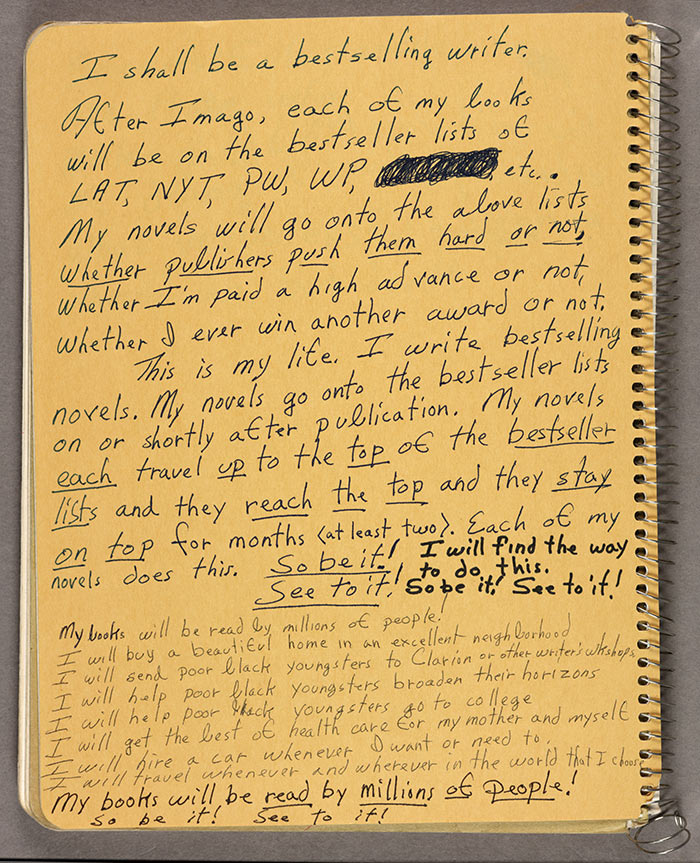18th November – 18th December 2020 is Disability History Month. Continuing our ongoing blog series celebrating diversity, we asked staff and students in the School of History for reflections on key individuals, groups, events and episodes related to the history of disability. The first contribution comes from PhD student Katie Heffner:
“So be it, see to it!”: The Legacies of Octavia E. Butler
“This is my life. I write best-selling novels.”[1] This incantation penned within Octavia E. Butler’s 1988 commonplace book, became a prophecy that materialized in 2020. Her novel, The Parable of the Sower (1993) reached the New York Times Best Seller’s List on 3rd September, almost three decades after it was first published.[2] As the first science fiction author to receive the MacArthur Genius award, Butler changed and shaped the genre of science fiction through her Afrofuturist works.[3] Her fiction centred the narratives of black protagonists with disabilities as she herself confronted racial, class, gender and ability-based discrimination.
Butler was undiagnosed with dyslexia as a child, which negatively impacted her earliest experiences of writing. Her school teachers believed that Octavia was ‘lazy and did not try hard enough.’[4] From these childhood experiences, Butler reframed the narrative of disability by believing herself to be a genius and highly capable. As a form of resistance, she began to create richly speculative narratives as a way to reimagine race, disability, class and gender. In her adulthood she became a diligent researcher, fusing historical scholarship with her radical imagination in her literary works. As she nurtured her ‘positive obsessions’, her disabilities were also compounded by classist and racialized in access to healthcare.[5]
Butler’s work explores abilities from various vantage points, blending science fiction and black radical traditions. The protagonist in the Parable of the Sower, Lauren, suffers from hyper-empathy syndrome. This condition causes Lauren to bodily experience the mental and physical hurt of others in a post-apocalyptic setting. With the collapse of her gated community that protected her from the outside world, Lauren is forced to embark on a dangerous journey on the abandoned Los Angeles freeway. Lauren must survive in a world marked by climate change, socioeconomic disparities, and migration, all while managing her hyper-empathy syndrome. Amidst crisis, Lauren is able to lead a group to Northern California to build the mutual aid collective Earthseed.

Butler’s literary works created distinct speculative spaces which explored re-imaginings of liberation, equity and access. As one of the preeminent authors of Afrofuturism, her works have carried an enduring literary legacy that continues to this day. Contemporary scholars and award-winning writers, such as Nisi Shawl, Nalo Hopkinson, N.K. Jemisin, and Sheree Renée Thomas, continue to build on Butler’s Afrofuturist traditions. Pleasure activist, black feminist, and author adrienne maree brown has utilized the philosophical underpinnings of The Parable of the Sower to write Emergent Strategy, a social justice guidebook to shape change. Adaptations of The Parable of the Sower have recently been explored in both print and on stage: the 2020 graphic novel, illustrated by Professor John Jennings of University of California Riverside, and Toshi Reagon’s 2018 work-in-progress opera. Edited collections of short stories, such as New Suns: Original Speculative Fiction by People of Color and Octavia’s Brood: Science Fiction for Social Justice Movements illustrate and explore liberation and equity through science fiction. These contemporary bodies of work continue to honour the tenacity and brilliance of Octavia E. Butler. As she often penned at the close of her writings in her journal, “So be it! See to it!”
Interested in reading Octavia E. Butler’s works? You can listen to the podcast Octavia’s Parables, each episode of which features hosts adrieene maree brown and Toshi Reagon reviewing a chapter of The Parable of the Sower. You can find a copy of the book right here in the Templeman Library.
Katie Heffner is a PhD candidate in the School of History researching the social and cultural history of women in science fiction fandoms. Her work explores how women in science fiction communities articulated and fabulated science and technology in the early Cold War.
[1] Octavia E. Butler papers. The Huntington Library, Art Collections, and Botanical Gardens. Copyright Estate of Octavia E. Butler.
[2] Dan Sheehan, ‘Octavia Butler has finally made the New York Times Best Seller List’ (2020) https://lithub.com/octavia-butler-has-finally-made-the-new-york-times-best-seller-list/ [Accessed 23/11/2020].
[3] MacArthur Fellows Program. Octavia Butler, Writer. (1995, 2006) https://www.macfound.org/fellows/505/ [Accessed 23/11/2020].
[4] Sami Schalk. ‘Experience, Research, and Writing: Octavia E. Butler as an Author of Disability Literature.’ Palimpsest: A Journal on Women, Gender, and the Black International 6, no. 1 (2017), 153-177, pg. 157 doi:10.1353/pal.2017.0018.
[5] Schalk, pg. 157.
Image at top of the page: Handwritten notes on inside cover of one of Octavia E. Butler’s commonplace books, 1988. Octavia E. Butler papers. The Huntington Library, Art Collections, and Botanical Gardens. Copyright Estate of Octavia E. Butler.

